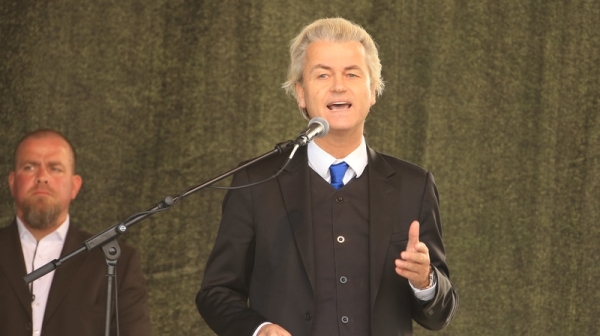Dutch elections veering far-right after Wilders’ mildness feign
A late surge in support could situate the anti-Islam politician Geert Wilders to play a key role in shaping the next Dutch government following Wednesday’s (22 September) parliamentary elections.
For most of the year, his political fortunes seemed spent, with support for his party dwindling to seven percent during the spring and early summer.
But a Tuesday poll showed Wilders’ Freedom party (PVV) tied in first place with the labour-green coalition led by former EU heavyweight Frans Timmermans and the centre-right liberal VVD party of outgoing prime minister Mark Rutte.
There is not one easy explanation for his comeback, but it appears to have started when the populist Farmers Party (BBB), with whom he shares significant voter overlap, started losing support over the summer.
No doubt his anti-Islam message was boosted by the mass slaughter committed by Hamas and the Israeli government, which respectively left 1,400 people killed in Israel and over 14,000 dead in Gaza.
But nothing has helped his last-minute success more than his avowed ‘mildness.’ Following 11 years of hard opposition, he launched his campaign, saying he was "ready to compromise on Islam."
"The Islam is in our DNA, but there are other things more important right now," he recently said during a televised interview with Dutch news channel Nieuwsuur.
His party programme still demands the Netherlands end all migration and exit the European Union — aims that can hardly be described as mild.
"The party’s strength lies in its consistency. Wilders’ message has hardly changed over the past 15 years," political scientist Simon Otjes concluded this week after analysing his electorate.
His voters — it turns out — support him not for his mildness but for his unyielding islamophobia. But Wilders’ milder vibe shift was well timed and most Dutch political press ate it up.
"While his desire to close the borders remains intact, Wilders no longer presented it as an absolute condition," longtime political commentator Frits Wester remarked in October.
This, he concluded, "signalled a willingness to make compromises."
A whiff of acceptability
But the initial whiff of acceptability quickly morphed into a storm of renewed enthusiasm for his nativist, anti-Islam message when voters started to realise Dilan Yeşilgöz — Rutte’s successor as VVD leader — was much more amenable to forming a coalition with him.
This turned out to be a mistake. Although never formally excluding him from government, everybody understood Rutte would never form a coalition with Wilders again after their minority government fell prematurely in 2012.
Yeşilgöz tried to play the same game. She stopped short from endorsing a future coalition with Wilders and roughly followed Rutte’s line of feigned disinterest.
But she turned out to be much less adept at countering Wilders’ in the following TV debates.
Yeşilgöz abruptly rediscovered "Wilders [conviction to] exclude certain people" in an attempt to halt the momentum shift — with little sign of success.
Hollow spin
The prevailing election narrative now goes that Wilders has run a clean campaign and has deftly used his opponent’s weaknesses to his advantage.
In a sense, this could justify his potential electoral success on Wednesday. Yet his success is built on the failings of journalists and his political opponents to recognise his claim to mildness for the hollow spin that it is.
His Party for Freedom is the only major party proposing a full stop to migration; he supports a so-called ‘Nexit’ referendum (the Dutch leaving the EU); he wants to prohibit Korans and mosques and wants to revoke legal asylum-permits of Syrians, claiming that war-torn Syria is "safe."
Legal residents returning home to their families would lose their permit to stay, if up to Wilders. Despite his promises that Islam is no longer his top priority, his party programme reflects on the war in Gaza extensively.
As a response to the crisis, he wants to shutter the Dutch consulate with the "corrupt" Palestinian authorities in Ramallah, describing Jordan as "the only Palestinian state."
He wants to revoke the €28bn climate fund, an achievement the last government fought hard for; he wants to expand oil- and gas extraction in the North Sea and stop deploying wind and solar parks.
He wants to cancel the 1951 UN refugee convention that outlines a refugee’s legal protection and rights. And if left to Wilders, the EU climate law and the 2015 UN Climate Agreement are "heading straight to the shredder."
The first exit polls are expect after 9PM this evening.

